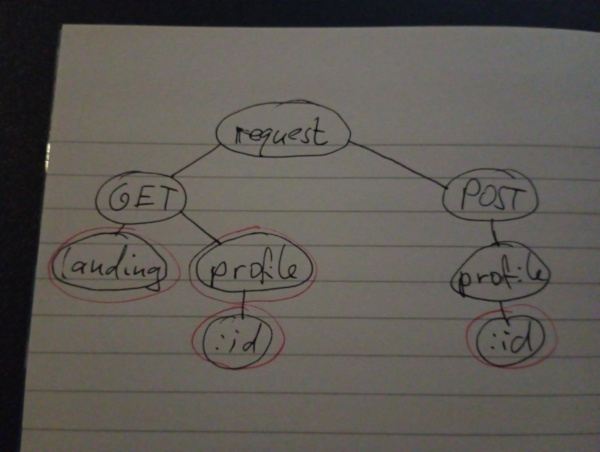I just got around to implement URI routing for my PHP framework. Given a setup such as
001 Route::get('page/landing', 'controller#action');
002 Route::get('page/profile/:id', 'controller#action');
003 Route::get('page/profile', 'controller#action');
004 Route::post('page/profile/:id', 'controller#action');
I figured it would be a waste to match every possible route against the request's URI until a match was found. Considering that there is an implied tree structure:

It seemed smart to preprocess the routes into a tree structure, and save said structure into memory for future requests to match directly against the request URI.
I ended up just serializing the structure and saving it into a file. The ideal solution would be to write a php file that directly creates the object tree (without dynamically parsing the routes first) and enabling opcache for it. The algorithms took me a bit of thinking to work out, but that was the fun part. Originally I had methods to write API and WEB routes, much like Laravel, until I noticed that the approach didn't work well with the tree structure. Thankfully it's not a must-have kind of abstraction anyways.
001 private function prepare_data()
002 {
003 // use $this->routes to build tree data
004 // set $this->prepared routes
005 // write 'system/data/routes.text' from serialized tree
006
007 $tokens = array(new FrameworkRouteToken('START'));
008
009 foreach ($this->routes as $route) {
010 $current = $tokens[0];
011 foreach ($route->tokens as $tok) {
012 $found = false;
013 foreach ($current->next as $check) {
014 if (FrameworkRouteToken::equals($tok, $check)) {
015 $current = $check;
016 $found = true;
017 break;
018 }
019 }
020 if (!$found) {
021 array_push($current->next, $tok);
022 $current = $tok;
023 }
024 }
025 }
026 // information for default route
027 if (FrameworkRoute::$default_target) {
028 $tok = new FrameworkRouteToken('DEFAULT');
029 $target = FrameworkRoute::$default_target;
030 $target = explode('#', $target);
031 $tok->controller_name = ucfirst($target[0]).'Controller';
032 $tok->action_name = $target[1];
033 array_push($tokens, $tok);
034 }
035 $this->prepared_routes = $tokens;
036 file_put_contents('system/data/routes.txt', serialize($tokens));
037 }
038
039 public function match_route()
040 {
041 $params = array();
042 $uri_route = array();
043 array_push($uri_route, $this->request->method);
044 var_dump($this->request->uri_elements);
045 foreach ($this->request->uri_elements as $el) {
046 array_push($uri_route, $el);
047 }
048 $tokens = $this->prepared_routes[0]->next;
049 foreach ($uri_route as $key => $str) {
050 foreach ($tokens as $tok) {
051 if ($tok->wildcard_f) {
052 if ($tok->match_condition) {
053 if (preg_match("/".$tok->match_condition."/", $str)) {
054 $params[$tok->name] = $str;
055 if ($key ===
056 array_key_last($uri_route) &&
057 $tok->controller_name)
058 {
059 $this->match_controller =
060 $tok->controller_name;
061 $this->match_action = $tok->action_name;
062 break 2;
063 } else {
064 $tokens = $tok->next;
065 break;
066 }
067 } else {
068 continue;
069 }
070 } else {
071 $params[$tok->name] = $str;
072 if ($key ===
073 array_key_last($uri_route) &&
074 $tok->controller_name)
075 {
076 $this->match_controller = $tok->controller_name;
077 $this->match_action = $tok->action_name;
078 break 2;
079 } else {
080 $tokens = $tok->next;
081 break;
082 }
083 }
084 } else {
085 if ($tok->name == $str) {
086 if ($key ===
087 array_key_last($uri_route) &&
088 $tok->controller_name)
089 {
090 $this->match_controller = $tok->controller_name;
091 $this->match_action = $tok->action_name;
092 break 2;
093 } else {
094 $tokens = $tok->next;
095 break;
096 }
097 } else {
098 continue;
099 }
100 }
101 }
102 }
103 if (!$this->match_controller) {
104 $target = FrameworkRoute::$default_target;
105 $target = explode('#', $target);
106 $this->match_controller =
107 $this->prepared_routes[1]->controller_name;
108 $this->match_action = $this->prepared_routes[1]->action_name;
109 }
110 }
Anyways. I took inspiration from Crafting Interpreters that teaches using a trie structure for parsing keywords. That I ended up writing a tree instead was a naive oversight on my part. Although going with a tree instead was probably the right call considering that parameter nodes need additional checking anyways.
Long story short, I had fun making use of knowledge I obtained from reading through a programming book semi-casually. The ideal URI routing algorithm probably depends on an application's routes anyways. What I did is quite overkill for a small app with only a couple of possible routes, for example.
Also, writing this post certainly had a purpose because I just noticed that there's an ambiguity issue. Given a routes.php of this setup:
001 Route::get('page/profile/:id');
002 Route::get('page/profile/extended/:id');
The URI https://www.example.org/page/profile/extended/5 would attempt to match against the first route page/profile/:id setting $param['id'] = 'extended' and not finding a matching token for the 5 anymore.
But I suppose simply ordering the arrays to put wildcards last should circumvent this issue.
